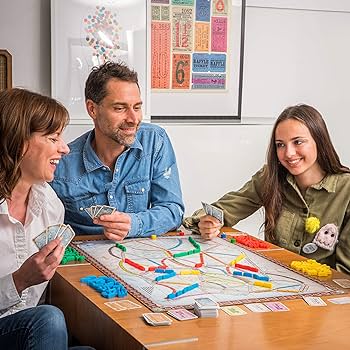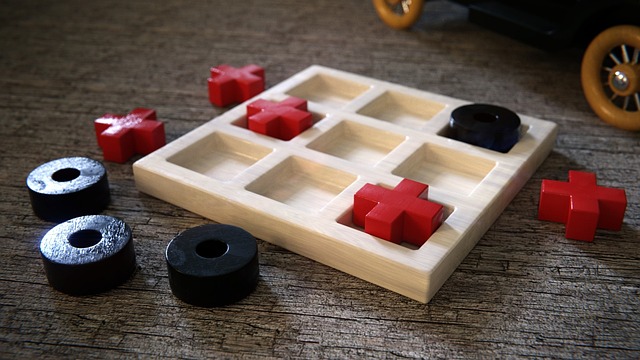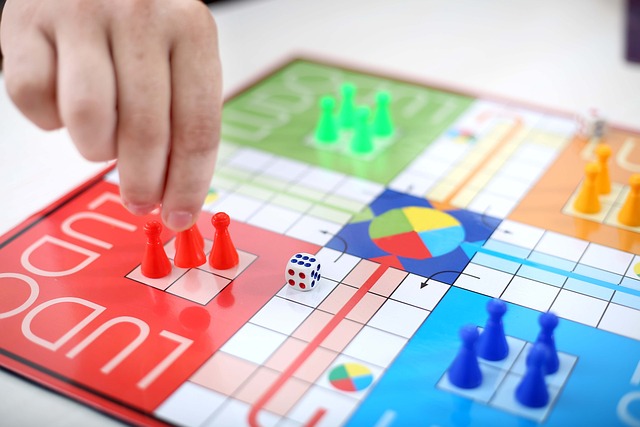
In today's fast-paced digital world, board games continue to provide a valuable source of entertainment and quality family time.
For competitive families seeking engaging and strategic gameplay, this article presents the top 12 must-have board games. These carefully selected games, such as Monopoly, Catan, Risk, and Clue, offer a perfect combination of excitement and intellect.
From wordplay in Scrabble to resource management in Agricola, this comprehensive list will satisfy the discerning tastes of families who desire both entertainment and intellectual stimulation.
Monopoly
Monopoly is a classic board game that offers a competitive experience for families. With its iconic gameplay and vibrant design, Monopoly has been a staple in households for decades.
To succeed in this game, players must employ strategic thinking and cunning maneuvers. Various Monopoly strategies have emerged over the years, each aimed at gaining a financial advantage and dominating the board. From purchasing properties strategically to negotiating shrewdly, players must navigate the game's intricacies to come out on top.
Furthermore, Monopoly house rules add an element of customization, allowing families to tailor the game to their preferences. Whether it's implementing a free parking jackpot or auctioning off properties, these rules add an extra layer of excitement and freedom to the game.
Catan
Catan, with its immersive gameplay and strategic decision-making, offers competitive families a fresh and engaging board game experience. The game revolves around players settling and expanding on the island of Catan, where resources such as wood, brick, wheat, sheep, and ore are essential for building settlements, cities, and roads.

To succeed in Catan, players must carefully plan their strategies for settling and expanding. One popular strategy involves focusing on acquiring resources that are in high demand and using them strategically to gain an advantage over opponents. Another key element of the game is trading and negotiating with other players. Successful trading and negotiating strategies can help players secure the resources they need, while also ensuring that they don't give away too much to their opponents.
In Catan, every decision counts, making it a thrilling game that challenges families to think strategically and make calculated moves to outwit their rivals.
Risk
In the game of Risk, players are tasked with developing a strategy for world domination. This involves carefully balancing alliances and rivalries, as well as managing limited resources.
The game requires players to think strategically and make calculated decisions in order to achieve their objectives.
Strategy for World Domination
Developing a strong strategy is essential for achieving world domination in the board game Risk. To maximize your chances of success, here are some strategy tips:
- Expand strategically: Instead of spreading your forces too thin, focus on conquering continents strategically. It will give you a higher chance of success and control over valuable territories.
- Form alliances: Diplomatic negotiations can be a powerful tool in Risk. Build alliances with other players to share information, coordinate attacks, and protect each other's interests. Trust and cooperation are key to achieving world domination.
- Manage your resources: Carefully manage your armies and territories to optimize your chances of success. Reinforce vulnerable areas, plan your attacks, and be prepared for unexpected counterattacks.
- Adapt and react: The game of Risk is dynamic and ever-changing. Be flexible in your strategy, adapt to the changing board state, and react accordingly to the moves of your opponents.
Balancing Alliances and Rivalries
To effectively navigate the complex dynamics of alliances and rivalries in the game of Risk, strategic players must carefully balance cooperation and competition.
In Risk, players must form alliances to conquer territories and expand their influence on the board. However, these alliances are temporary, as each player ultimately aims to achieve their individual goal of world domination.

Navigating rivalries in cooperative board games like Risk requires players to strike a delicate balance between working together and pursuing their own interests. The key to success lies in maintaining a harmonious alliance while also keeping an eye on one's own strategic objectives.
Managing Limited Resources
Navigating the strategic landscape of Risk also involves effectively managing the limited resources available to players. In this game, managing scarce resources and making decisions under constraints are essential skills. Here are four key aspects to consider when managing limited resources in Risk:
- Territory control: Players must strategically allocate their armies across different territories to maximize their control and defend against opponents. This requires careful planning and decision-making to ensure the optimal use of limited resources.
- Card management: Risk incorporates a card system that allows players to trade in sets for additional armies. Players must decide when to trade in cards and when to hold onto them, balancing the need for immediate reinforcements with the potential for greater rewards later.
- Alliance formation: Forming alliances with other players can help conserve resources by sharing the burden of defense and attack. However, players must also be wary of trusting their allies too much and be prepared to break alliances when necessary.
- Risk assessment: Lastly, managing limited resources in Risk necessitates evaluating the potential risks and rewards of different actions. Players must weigh the costs and benefits of expanding their territories, launching attacks, and defending against opponents to make informed and strategic decisions.
Clue
The classic board game, Clue, is a must-have for competitive families seeking a thrilling and strategic gaming experience. Clue is known for its ability to engage players in solving mysteries, making it a great game to enhance deductive reasoning skills. By analyzing clues, gathering information, and making logical deductions, players develop their critical thinking abilities and learn to think strategically.
What makes Clue even more appealing is its timeless nature. It has been a favorite among generations and continues to provide classic family entertainment. The game's combination of suspense, strategy, and intrigue captivates players of all ages. Clue's enduring popularity can be attributed to its engaging gameplay, intriguing storyline, and the element of surprise it offers. It provides an opportunity for families to come together, bond, and have fun in a competitive and intellectually stimulating setting.
With its impact on deductive reasoning skills and its status as a classic family favorite, Clue is a game that should not be missed by competitive families seeking an exciting and challenging board game experience.
Scrabble
Continuing the exploration of classic board games that enhance critical thinking skills, Scrabble is a must-have for competitive families seeking a challenging and intellectually stimulating gaming experience. This iconic word game has stood the test of time, captivating players of all ages with its blend of strategy, vocabulary, and point-scoring opportunities.
To excel in Scrabble, players can employ various tips and strategies to improve their vocabulary and maximize point values:

- Expand your word repertoire: Read, study word lists, and play regularly to enhance your vocabulary.
- Utilize high-value tiles: Make the most of tiles like Q, Z, X, and J, which offer higher point values.
- Form multiple words: Look for opportunities to create multiple words with a single play, maximizing your score.
- Control the board: Strategically place your words to block opponents and create new scoring opportunities for yourself.
The Game of Life
Moving on to another classic board game that promotes decision-making and strategic thinking, families can frequently enjoy the engaging gameplay of The Game of Life.
In this game, players navigate through various stages of life, making important decisions that can impact their overall success. The importance of decision making in The Game of Life cannot be overstated, as each choice can lead to different outcomes and determine the player's financial, professional, and personal well-being.
To achieve success, players must carefully consider their options, weigh the potential risks and rewards, and make calculated moves. Strategies for success in The Game of Life include planning ahead, adapting to unexpected challenges, and making wise investments.
Additionally, players must also be mindful of their competitors' actions and adjust their strategies accordingly. By mastering decision-making and employing effective strategies, families can enjoy a thrilling and rewarding gaming experience with The Game of Life.
Ticket to Ride
Next on the list of must-have board games for competitive families is Ticket to Ride. This popular game combines strategy, planning, and a dash of luck to create an exciting and engaging experience for players of all ages.
Here are some top strategies for building train routes in Ticket to Ride:
- Plan Ahead: Take the time to analyze the game board and identify key routes early on. This will allow you to focus your efforts on completing those routes and earning valuable points.
- Block Your Opponents: Strategic blocking can be a powerful tool in Ticket to Ride. By placing your trains strategically, you can prevent your opponents from completing their desired routes and gain a competitive advantage.
- Collect Wild Cards: Wild cards can be a game-changer in Ticket to Ride. By collecting these versatile cards, you will have more flexibility in building your train routes and adapting to changing circumstances.
- Balance Long and Short Routes: While long routes may offer more points, they also require more trains to complete. It is important to strike a balance between long and short routes to maximize your point potential.
For added gameplay variety, consider exploring the best expansion packs for Ticket to Ride. These expansions introduce new maps, rules, and challenges, taking the game to new heights and keeping the gameplay fresh and exciting for years to come.

Carcassonne
Another popular game that complements Ticket to Ride is Carcassonne, a strategic board game that offers a unique and immersive experience for competitive families.
Carcassonne revolves around tile placement and medieval city building, requiring players to strategically place tiles to expand their cities, roads, and fields. The game begins with a single tile placed in the center of the table, and players take turns drawing and placing tiles to extend the landscape.
As the game progresses, players have the opportunity to claim features on the tiles by placing their meeples, which are small wooden figures, on cities, roads, or monasteries. Points are earned by completing features, and the player with the highest score at the end of the game emerges victorious.
Carcassonne's simple rules, tactical gameplay, and limitless possibilities make it a must-have for families seeking an engaging and competitive board game experience.
Splendor
Splendor is a highly regarded board game that offers an immersive and strategic gaming experience for competitive families. It combines gem collection strategies with the need to balance economic growth and strategic planning. Here are four reasons why Splendor is a must-have for families seeking a game that promotes freedom and competition:
- Engaging gameplay: Splendor's gem collection strategies require players to make thoughtful decisions and adapt their strategies to outwit their opponents.
- Strategic planning: Balancing economic growth with strategic planning is crucial for success in Splendor, as players must carefully manage their resources and investments.
- Immersive experience: The game's immersive design and high-quality components draw players into a world of gem trading and economic expansion.
- Competitive fun: Splendor provides a thrilling experience for competitive families, where every move counts and victory is earned through skillful gameplay.
Splendor is the perfect choice for families who desire a challenging and rewarding board game that encourages strategic thinking and friendly competition.
Agricola
Agricola is an essential board game for competitive families, offering a rich and immersive farming experience. The game's unique worker placement mechanic allows players to strategically allocate their farmers to various actions, such as plowing fields, sowing crops, and raising livestock. This aspect of the game requires careful planning and decision-making, as players must prioritize their actions to maximize their farm's productivity.

In Agricola, players also face the challenge of balancing family growth with resource management. As the game progresses, players can expand their family, which allows for more actions to be taken each round. However, this also means more mouths to feed, requiring players to efficiently gather and manage resources.
Agricola's blend of farming strategy, worker placement, and resource management creates a dynamic and engaging gameplay experience that appeals to competitive families seeking a game that offers both depth and replayability.
Dominion
Dominion is known for its strategic gameplay, offering players a wide range of choices and decisions to make throughout the game.
With its deck-building mechanics, players must carefully manage their resources and cards to build the most efficient and effective deck.
This competitive game provides a fun and engaging experience for families, fostering healthy competition and encouraging players to think critically and strategically.
Strategic Gameplay in Dominion
With its intricate mechanics and focus on careful planning, Dominion offers families a strategic gameplay experience that is both engaging and challenging. Players must develop a Dominion strategy that involves deck building tactics to build the most efficient and powerful deck of cards.
Here are four key aspects of strategic gameplay in Dominion:

- Resource Management: Players must carefully manage their resources, such as coins and actions, to maximize their card purchases and actions each turn.
- Card Combos: Creating powerful card combinations is crucial to gaining an advantage over opponents. Discovering synergies between different cards can lead to game-changing moves.
- Timing: Knowing when to play certain cards and when to hold back is essential. Timing can make all the difference between a successful turn and a missed opportunity.
- Adaptability: Being flexible and able to adjust strategies based on changing game conditions is a key skill in Dominion. Players must be able to adapt to the actions of their opponents and make strategic decisions accordingly.
Dominion provides families with a rich and strategic gameplay experience that will keep them coming back for more.
Family-Friendly Competition in Dominion
Family-friendly competition in Dominion fosters a spirit of camaraderie and excitement among players as they strive to outwit and outmaneuver each other.
Dominion is a strategic deck-building game where players aim to create the most efficient and powerful kingdom. What makes Dominion suitable for family play is its blend of accessible mechanics and deep strategy.
The game offers a variety of different cards that players can use to build their decks, allowing for endless combinations and strategies. Each player starts with the same basic cards and must strategically purchase new cards to improve their deck. This creates a level playing field and encourages players to think critically about their choices.
The game also features interactive gameplay, where players can directly affect each other's progress, adding an extra layer of excitement and competition.
Power Grid
Power Grid, a strategic economic board game, offers competitive families the opportunity to engage in complex decision-making and resource management. With its emphasis on efficient resource management and strategic city placement, Power Grid challenges players to carefully allocate their limited resources and plan their moves strategically to gain an advantage over their opponents.
In Power Grid, players must carefully manage their resources, such as coal, oil, garbage, and uranium, to generate electricity and power their expanding network of cities. Efficient resource management is crucial to ensure a steady supply of power while minimizing costs.

Strategic city placement is another key aspect of the game. Players must carefully select which cities to connect to their power grid, considering factors such as the availability of resources, the potential for future expansion, and the competition from other players. Making the right choices can lead to increased income and victory points, while poor decisions can leave players struggling to keep up.
Frequently Asked Questions
How Long Does a Typical Game of Monopoly Last?
On average, a game of Monopoly lasts around 2 to 4 hours, depending on various factors such as the number of players, their level of experience, and the strategies employed. To increase chances of winning, players should focus on acquiring properties and establishing a strong financial position.
Are There Any Expansions or Variations of Catan Available?
Yes, there are several versions and expansions of Catan available, offering variations in gameplay and themes. Some popular expansions include "Seafarers," "Cities & Knights," and "Traders & Barbarians," each adding new mechanics and strategic elements to the base game.
Can You Play Risk With Just Two Players?
Playing Risk with just two players can be just as intense as playing with more players, as it requires strategic thinking and decision-making. There are various strategies that can be employed to make the game enjoyable and competitive for two players.
What Is the Recommended Age Range for Playing Clue?
The recommended age range for playing Clue is typically 8 years and older. However, younger players can still enjoy the game by modifying the rules to make it more accessible and fun for them.
How Many Tiles Are Included in the Standard Version of Carcassonne?
The standard version of Carcassonne includes 72 tiles. To maximize points in Carcassonne, strategic placement of tiles is key. When introducing younger children to the game, it is helpful to simplify the rules and focus on basic scoring strategies.
 Family Craft ProjectsHome ImprovementCooking and BakingReuse and RecycleDIY GiftsEco-Friendly ProjectsDIY Home SolutionsSeasonal ActivitiesFun and GamesLearn TogetherPrivacy PolicyTerms And Conditions
Family Craft ProjectsHome ImprovementCooking and BakingReuse and RecycleDIY GiftsEco-Friendly ProjectsDIY Home SolutionsSeasonal ActivitiesFun and GamesLearn TogetherPrivacy PolicyTerms And Conditions
